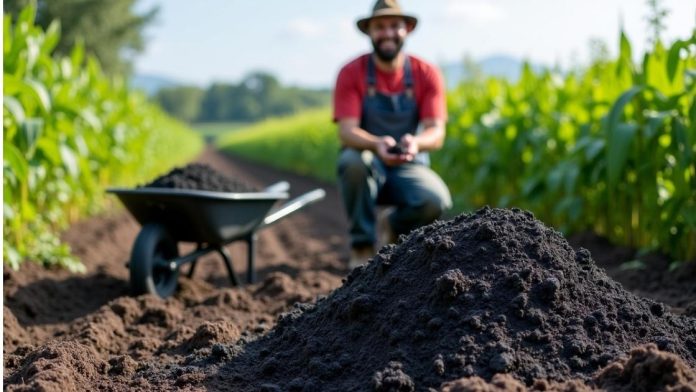Imagine if we could take agricultural waste, turn it into a powerful soil enhancer, lock away carbon for centuries, and boost food security—all in one go. Sounds like science fiction? It’s not. It’s called biochar, and it’s gaining attention worldwide for its game-changing benefits.
In an age where climate change is real, soil health is declining, and farmers are battling unpredictable seasons, we need sustainable solutions that work. Biochar is one of those rare innovations that checks all the boxes. It’s simple in concept but profound in impact: an ancient practice revitalized for modern challenges.
So, whether you’re a backyard gardener, a large-scale farmer, or simply someone passionate about sustainability, keep reading—you’re about to uncover how biochar could help heal the planet and improve your crops at the same time.
What Exactly Is Biochar?
Let’s break it down.
Biochar is a form of charcoal made by heating organic material (like crop residue, wood chips, or manure) in a low-oxygen environment—a process called pyrolysis. This locks carbon into a stable form, preventing it from releasing into the atmosphere as CO₂.
But biochar isn’t just for carbon capture. When applied to soil, it boosts fertility, improves structure, retains moisture, and even supports microbial life. It’s like a Swiss Army knife for soil health.
The Many Faces of Biochar Applications
Biochar’s versatility makes it valuable across multiple sectors. Here’s where it’s making a big impact:
1. Agriculture and Gardening
This is biochar’s most celebrated role—and for good reason.
Benefits in soil:
-
Increases nutrient retention
-
Enhances water-holding capacity
-
Improves pH balance
-
Supports beneficial microbes
-
Reduces the need for chemical fertilizers
Real-life tip: Mix biochar with compost before applying it to your soil. This “charges” it with nutrients and prevents nitrogen drawdown (when biochar initially pulls nitrogen from the soil).
2. Waste Management and Composting
Biochar turns organic waste into a high-value resource instead of letting it rot in landfills or release methane.
In composting:
-
Reduces odors and pathogens
-
Speeds up decomposition
-
Traps nutrients that would otherwise leach away
It’s a win-win for both waste reduction and soil improvement.
3. Water Filtration and Pollution Control
Because of its porous structure, biochar is excellent at adsorbing contaminants.
Applications include:
-
Treating greywater
-
Filtering runoff in farms
-
Capturing heavy metals and toxins
In fact, some municipalities are exploring biochar filters for stormwater management—nature’s own water purifier!
4. Livestock and Animal Health
This might surprise you: adding biochar to animal feed or bedding can improve livestock health.
Why?
-
Reduces methane emissions from digestion
-
Absorbs toxins in the gut
-
Minimizes ammonia smells in bedding
Farmers in Europe and Asia have already adopted this practice with noticeable improvements in herd health and environmental impact.
5. Carbon Sequestration and Climate Action
Perhaps the most powerful benefit of all: biochar locks carbon in the ground for hundreds to thousands of years. This makes it a reliable method of carbon sequestration and a potential tool for reversing climate change.
Some carbon credit markets even recognize and reward biochar-based carbon storage.
How to Use Biochar in Your Own Projects
If you’re ready to give biochar a try, here are a few easy ways to start:
1. Start Small in Your Garden
Buy pre-activated biochar or make your own using wood waste. Mix it with compost before applying it to your plants.
2. Use in Compost Bins
Add a handful of biochar to your compost to control odor and boost microbial activity.
3. Try in Animal Bedding
If you keep chickens, goats, or other livestock, sprinkle biochar in their bedding. It helps absorb moisture and reduces smell.
4. Test on Houseplants
Mix a small amount into your potting soil to observe benefits in water retention and root health.
Real-World Impact: Who’s Using Biochar?
-
India: Farmers in Tamil Nadu are integrating biochar with organic fertilizers to improve yields while combating drought.
-
USA: Viticulturists in California are applying biochar to vineyard soils to boost resilience against climate stress.
-
Kenya: Smallholder farmers are turning crop waste into biochar to reduce input costs and increase food production.
These aren’t just isolated experiments. They’re part of a growing global movement toward regenerative practices.
FAQs About Biochar Applications
1. Is biochar the same as charcoal?
Not quite. While both are carbon-rich and created by burning organic material, biochar is specifically made for soil application and follows controlled pyrolysis processes to maximize benefits.
2. Can I make biochar at home?
Yes! With simple tools like a homemade retort kiln or a pit method, you can convert yard waste into usable biochar. Just be sure to follow safety and temperature guidelines.
3. Will biochar work in all soil types?
Biochar benefits most soils, especially degraded or sandy ones. But it’s important to “charge” it with nutrients before application to avoid nitrogen depletion.
4. How long does biochar last in the soil?
Unlike compost or mulch, biochar doesn’t break down quickly. It can stay in the soil for hundreds to thousands of years, making it an incredible long-term investment in soil health.
5. Is biochar safe for organic farming?
Absolutely—biochar is permitted under many organic standards, as long as the feedstock used to make it is also organic.
Conclusion
In a world battling soil degradation, food insecurity, and climate instability, biochar emerges as a quiet hero. It doesn’t scream for attention or demand fancy infrastructure. It simply turns waste into wealth, carbon into storage, and soil into a thriving ecosystem.
And the best part? It’s something you can be part of.
Whether you’re growing tomatoes in your backyard or supporting global sustainability efforts, biochar offers a hands-on way to make a real difference. So let’s get our hands dirty—for the good of the earth.
Have you experimented with biochar in your garden, compost, or farm? What were your results? Share your insights and your time-saving, soil-building strategies in the comments below—we’d love to hear your story!

